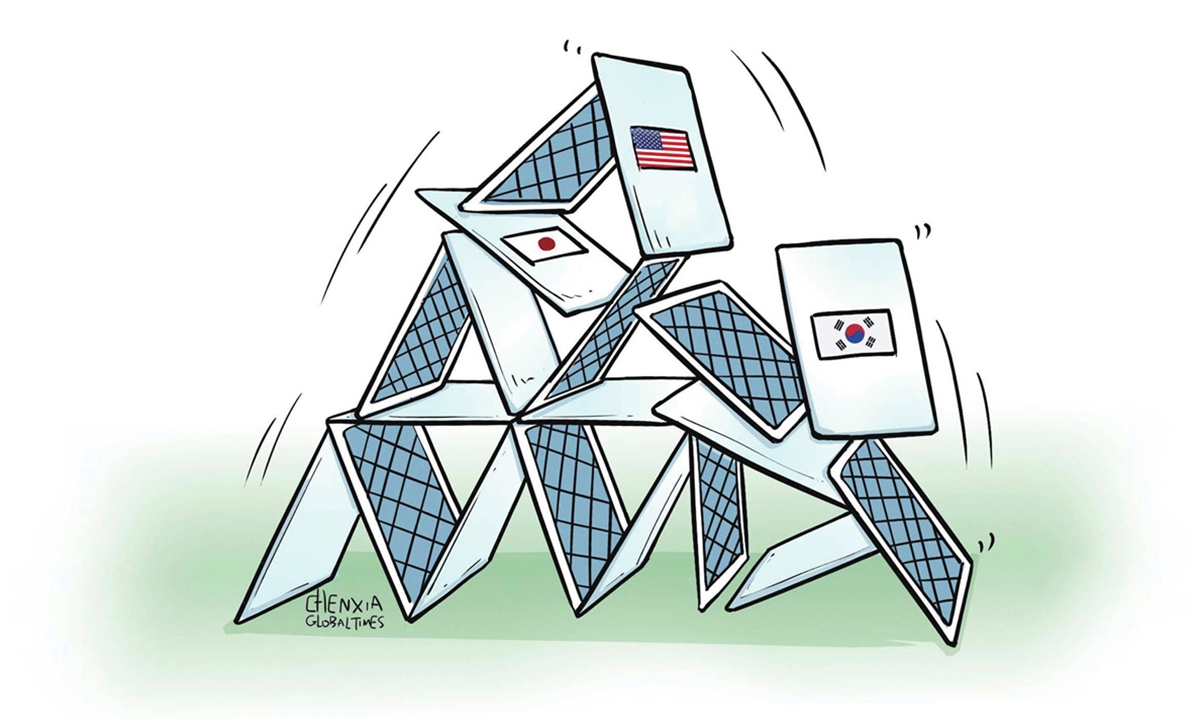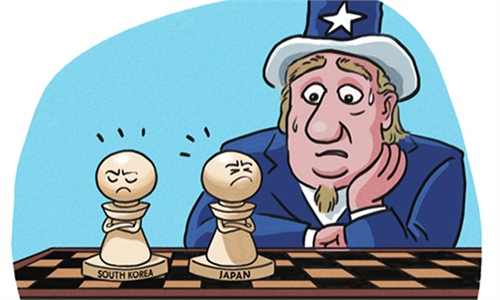
Illustration: Chen Xia/GT
On Friday, the US, Japan and South Korea will hold a summit meeting at Camp David. It's widely believed that the goal of the meeting is to form and consolidate an anti-China coalition. However, State Department Deputy Spokesperson Vedant Patel said on Tuesday that "there is no reason to view this summit as provocative or any kind of step or effort to incite tensions." They are wrapping their agenda with beautiful words, as Confucius said, those who frequently do wrong often attempt to cover up their wrongdoings.Various facts demonstrate that the cooperation between the US, Japan and South Korea is gradually shifting toward targeting China. Looking at history, the US has been committed to promoting reconciliation between South Korea and Japan since the beginning of the Cold War, aiming to establish a close US-Japan-South Korea triangle alliance to counter the threat of the Soviet Union. After the Cold War, the US progressively turned its attention to China. However, it suffered frustrations due to the fact that in the past, multiple South Korean governments had concerns and the majority of the South Korean population had anti-Japanese sentiments. Today, with a pro-American and pro-Japanese government in South Korea, the US is finally seizing this opportunity and certainly doesn't want to miss it.
This US-Japan-South Korea summit carries a strong anti-China nature. According to reports, the three countries will discuss strengthening cooperation in various areas such as military, security, cyberspace, technology, supply chains, Taiwan question and the Russia-Ukraine conflict among others. Their objective is to institutionalize their cooperation, align their understanding of common threats, enhance coordination, conduct regular joint military exercises, expand cooperation on ballistic missile defense, and elevate the cooperation between the three countries to an independent regional mechanism.
Japan, the US and South Korea have mainly claimed to be working together to counter the North Korean threat, but anyone with keen eyes can recognize what their real motivations are. These elaborate disguises and pomp are unnecessary if their target is North Korea, because the trio is accustomed to viewing North Korea as a threat.
The hypocrisy of the US, Japan and South Korea is not confined to this instance; rather, it's a habitual practice. They employ flowery language to package and disguise their true goal, leading astray those who are unaware of the truth.
While it's evident that the cooperation between the US, Japan and South Korea takes aim at China, they dare not admit it. To put it diplomatically, this is a matter of diplomatic rhetoric. However, it's widely understood that this type of collaboration cannot be conducted openly in broad daylight; furthermore, it's far from being conducted in a straightforward and transparent manner. This is because such cooperation undermines regional stability, fractures regional unity, hinders regional exchanges and runs counter to the global trend. Furthermore, anti-China actions do not align with the interests of most countries and people in the region.
The China-proposed international cooperation initiative, the Belt and Road Initiative, has promoted economic development in partner countries. China's peaceful rise has garnered support from the majority of countries worldwide. Oddly, as China's economy grows and its influence expands, and as global peace prevails, the US, Japan and South Korea have grown restless, resorting to various forms of disinformation to smear China and forming cliques under various pretexts.
It's important to emphasize that elevating the cooperation between the US, Japan and South Korea to a trilateral alliance does not serve South Korea's fundamental interests. South Korea's security and prosperity depend on friendly relations with neighboring countries rather than engaging in camp-based confrontation, which would only make it a pawn and a sacrificial lamb. Once the US-Japan-South Korea alliance is solidified, South Korea would be compelled to cede partial sovereignty to Japan, leading to a situation of joint influence by the US and Japan over South Korea. At that point, South Korea would be completely bound to the chariots of the US and Japan, without the freedom to make independent choices. Ironically, South Korean President Yoon Suk-yeol has claimed that Rose D. Friedman's Free to Choose had "the greatest influence on (his) formation of values."
History and global trends will once again prove that a just cause enjoys abundant support while an unjust cause finds little support. Regardless of how the US, Japan and South Korea attempt to conceal their anti-China intentions and actions, they will eventually fail to garner support from most countries. China will continue to promote mutually beneficial cooperation, inclusive development and the establishment of a community with a shared future for mankind.
The author is director and professor of the Center for Korean Peninsula Studies at the Shanghai University of International Business and Economics. opinion@globaltimes.com.cn

